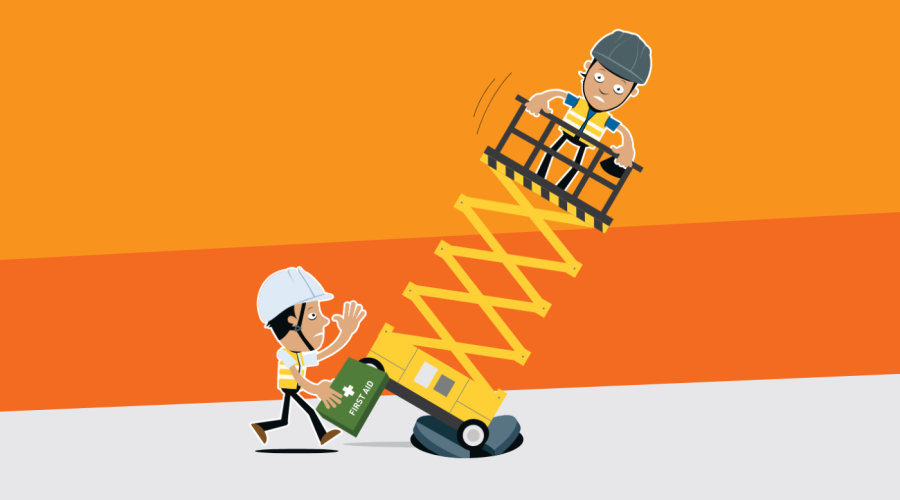IPAF report gives new insight into MEWP accidents worldwide

Accidents while using Mobile Elevating Work Platforms (MEWPs) are proportionally more likely when working in public areas or alongside roads than on controlled work sites such as construction sites, commercial or rental premises, according to the latest detailed safety analysis from the International Powered Access Federation (IPAF).
IPAF’s Global MEWP Safety Report 2016-2018 presents key findings from the federation’s analysis of accident statistics gathered through its worldwide accident reporting project, which has incident reporting from 25 countries around the globe. The report is now available to view or download via www.ipaf.org/accident
Accidents on construction sites account for the joint highest average number per year, but as MEWPs are used much more widely in construction than in other sectors and locations, they are in fact proportionally less likely to occur on a controlled work site than in a remote location or a public area, such as alongside a road, the report shows.
As well as the increased proportional risk of an accident occurring when working away from controlled job sites, the new report identifies recurring underlying causes of incidents involving MEWPs as falls from the platform, electrocutions, entrapments, MEWP tip-overs and MEWPs being struck by another vehicle. This is in line with previous years’ fatal accident analysis and demonstrates yet again that the industry should focus on ways to reduce underlying factors common to these types of incident.
Richard Whiting, IPAF’s General Market Manager for UK & Ireland, who has been working to finalize the report and present the findings, says: “With this report there’s a new methodology to much of the analysis and the way the findings are presented, plus the report is interspersed with key recommendations to mitigate common risk factors. We’ve worked hard along with a dedicated group of IPAF members to analyze, interpret and present the data in a new way, to assist the wider industry to stay safe.
“One key change is that, rather than comparing a full year’s accident data to previous years, the most recent three full years of available data have been combined to produce an aggregate and average number of incidents – combining data into a larger overall set allows trends over time to be more readily identified.”
Other key indications include: The industries in which deaths most frequently are forestry and construction, with maintenance and electrical service sectors third and fourth respectively. Both forestry and construction had an annual average of 19 reported fatalities, but the total number of days worked using MEWPs in construction worldwide is far higher than in forestry, so a fatal accident is proportionally more likely in the latter than on a construction site.
Whiting comments: “Renewed focus must be brought to bear to warn managers and operators of the relatively higher proportional risks of a major or fatal accident when not working on a controlled, segregated work site. IPAF’s Street Smart safety campaign already seeks to do this; we must look at how best to evolve this campaign to help reduce electrocutions or other accidents in forestry, for instance.”
Peter Douglas, IPAF’s CEO & MD, who as a member of the UK Country Council was instrumental in initiating the ongoing worldwide incident reporting project in 2012, comments: “MEWPs are still among the safest ways to conduct work at height. When unplanned incidents do occur, it is vital we capture that data and analyze the resulting statistics to see what trends are occurring and to influence IPAF’s technical guidance, adapt our training program and inform our safety campaigns.
“We must work with our members and all industry stakeholders to improve incident reporting. It’s vital that all incidents including minor mishaps and near misses are logged; this helps identify heightened risk and mitigate underlying factors to reduce the number of major accidents or fatalities that do occur using the knowledge gained.
“Some people may be unaware of IPAF’s reporting portal, while others may feel they will get into trouble if they report something. Our portal via www.ipaf.org/accident is quick, simple and allows any incident to be logged with total anonymity, so I urge anyone who is aware of an accident involving a MEWP that might not have been reported to log on and enter the details without delay – it may help save a life in future!”
All companies and individuals are encouraged to report incidents involving MEWPs, Mast Climbing Work Platforms (MCWPs) and other types of lifting equipment via www.ipaf.org/accident; specific details such as names, location, machine brand are not required to report an incident. Reporting is available in multiple languages. Users can sign in to the IPAF portal or report anonymously with one click, and are asked to provide as much information as possible about the incident, including details such as when it occurred, who was in charge and who was affected, what was the outcome, what was the MEWP category, how was the machine being used and what happened.
